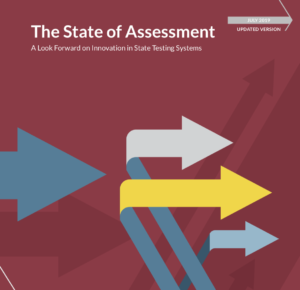Intersection Webinar Recap: Innovation in State Testing Systems

The national conversation about state assessment systems is often dominated by reports of testing fatigue among students and educators, which can make state leaders reluctant to undertake significant assessment reform efforts.
But there are compelling reasons why policymakers should devote more of their focus to state tests – namely the fact that state leaders use assessments as a key factor in consequential education policy decisions around school accountability and teacher evaluation.
Assessment systems are fundamental pieces of every state’s education policy framework and state policymakers should think creatively about innovative strategies to maximize their usefulness.
 A new report from Bellwether Education Partners shines a light on state leaders who are doing just that. The State of Assessment:A Look Forward on Innovation in State Testing Systems highlights promising work underway in states across the country on innovative assessment reforms. The report’s authors, Brandon Lewis and Bonnie O’Keefe, found plenty of reasons for optimism about the future trajectory of state assessment systems.
A new report from Bellwether Education Partners shines a light on state leaders who are doing just that. The State of Assessment:A Look Forward on Innovation in State Testing Systems highlights promising work underway in states across the country on innovative assessment reforms. The report’s authors, Brandon Lewis and Bonnie O’Keefe, found plenty of reasons for optimism about the future trajectory of state assessment systems.
Learn more about The State of Assessment report from our key takeaways and full webinar recording below.
Key Takeaways | The State of Assessment: A Look Forward on Innovation in State Testing Systems
- Bonnie and Brandon looked at four main areas where states are developing new solutions to assessment challenges:
- Interim assessments for accountability, which offers educators timely, actionable feedback.
- Formative assessments to support instruction, which offers rich, immediate data on student learning.
- Interstate collaborations and shared item banks, which offers access to high quality test items at a lower cost.
- Science and Social Studies assessments, which can serve as laboratories of innovation.
- After walking attendees through potential risks and best practice examples of each assessment category, Brandon and Bonnie zoomed out to evaluate the nationwide landscape of innovative assessment policies. They found that each state could be grouped into one of three camps:
- A small number of states making big public plays around innovation including states pushing for interim assessments for accountability. These states are making significant investments in new models and resources to push the boundaries of what state assessment systems can look like.
- A larger group of states making gradual shifts in their assessment systems. These states are considering ways to use assessment to improve teaching and learning, not just accountability.
- States that are in retreat on assessment, reducing investment to the minimum. These states are responding to pressure to reduce testing time and political pressure. These states could reverse the progress made in the last decade and leave students worse off.
- Although only a few states are thinking big about innovation, Brandon and Bonnie don’t think that is necessarily a cause for concern. Their main takeaway from their landscape review is that the number of states that are quietly and gradually shifting their role in assessment may be larger than we know, suggesting a brighter future for state assessment than the current public discourse would suggest.
Watch the webinar
Register here for our upcoming Intersection Webinars:
See you at The Intersection!
The Hunt Team
The post Intersection Webinar Recap: Innovation in State Testing Systems appeared first on The Hunt Institute.
